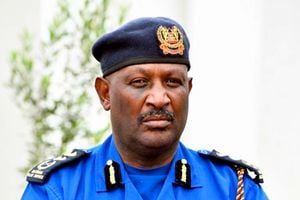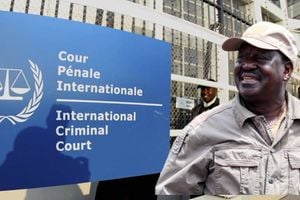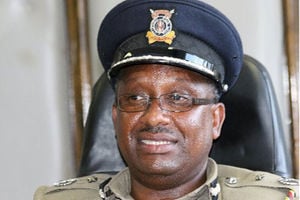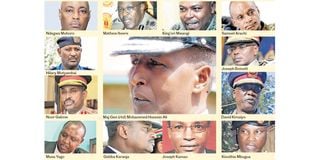
A collage of Kenya's top cops over the years.
As the global spotlight turns to Kenya’s law enforcers following plans to deploy them to Haiti despite growing local security challenges, we look back at the men and women who have shaped the police since 2004 when a military officer was brought in to restore order.
The recent death of King’ori Mwangi has turned the spotlight on officers who shaped the police in the last 20 years in careers that were intertwined with some of the country’s most momentous events.
In 2004, less than two years into his presidency, President Mwai Kibaki, distraught by mismanagement and corruption in the police force, departed from tradition and appointed Kenya Army Brigadier Mohammed Hussein Ali as the Police Commissioner (He was later promoted to Major General).
Maj Gen Ali had express instructions to fight criminal gangs and reform a police force that was quickly losing the public’s trust.
And fight he did. The six years he served as police boss were some of the most tumultuous in the country’s history.
The former paratrooper, the first ever military officer at the helm of the police force, began reforms and first disbanded the Kenya Police Reserve, introduced better recruitment processes and restructured the hierarchy that was dogged by corruption, criminal involvement and human rights abuses. He set up special units with hand-picked talented officers that hunted down, killed and prosecuted suspected criminals with precision that ensured reduction in criminal activities.
The new police boss embarked on a crackdown on Mungiki, the dreaded proscribed criminal group, which had been terrorising Kenyans – particularly in Nairobi, Rift Valley and the Mt Kenya regions. So ruthless in the crackdown was the police that they were cited for human rights abuses and accused of forced disappearance of hundreds of youth but to his credit the Mungiki menace was terminated. It was also during his tenure that police and the military ruthlessly dealt with the Sabaot Land Defence Force.
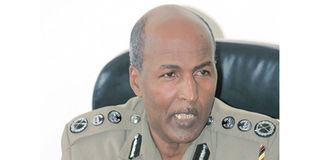
Former Police Commissioner Mohammed Hussein Ali.
But following the 2007/2008 post-election violence, under Maj Gen Ali, police was cited for excessive use of force and the shoot-to-kill order allegedly given from the commissioner’s office. Post-election investigation reports linked most of the killings of victims to police bullets.
Administration Police Commandant Kinuthia Mbugua was also caught up in the accusations.
Subsequently, Maj Gen Ali was in 2010 named in the summons by the International Criminal Court (ICC) prosecutor Louis Moreno-Ocampo for his role in the post-election violence but two years later, the court found no evidence to hold him culpable.
Maj Gen Ali was also cited by the UN Special Rapporteur Philip Alston investigating extra-judicial killings and a stumbling block in inves-tigations.
Twenty years later, Maj Gen Ali is remembered for bringing discipline and sanity into a police force that had been dogged by corruption, indiscipline and criminality.
Many corrupt traffic police officer were sacked during his tenure.
The military man streamlined deployments, transfers and promotions, eliminating nepotism, tribalism and favouritism within the police.
It was also during his tenure that the government built many houses for police officers, patrol vehicles procured and salaries increased.
One other significant thing in his term was the seizing of 1.1 tons of cocaine worth Sh6 billion in Nairobi’s Embakasi area and Malindi.
Alongside the then-Director of the Criminal Investigation Department (CID) Joseph Kamau, Maj Gen Ali kept a tight leash on the investigations that led to the prosecution and jailing of several suspects in Kenya and Netherlands.
The drug haul that some powerful forces reportedly wanted released was finally incinerated under supervision of the international community at Kenya Medical Research Institute in Nairobi.
Also Read: Ali hangs up his boots after four decades
After his exit, police fell back to arbitrary transfers, nepotism, tribalism and rampant corruption. It has been down a slippery slope ever since. Kamau would later fall out with Maj Gen Ali, leading to his dismissal.
Kamau had been a long-time detective, culminating in his Banking Fraud Investigation Unit (BFIU) before he was appointed CID boss.
A holder of a master’s degree in police studies from the University of Exeter, Kamau rose to prominence while leading investigations into the Goldenberg scandal — Kenya’s biggest economic heist — when heading the BFIU.
His team interrogated Kamlesh Pattni, Prof George Saitoti, former Treasury Principal Secretary Wilfred Koinange, former Central Bank of Kenya (CBK) director Eric Kotut and his deputy Eliphaz Riungu.
The team recommended the prosecution of Pattni, Koinange, Riungu and former CBK employees Lazarus Wairagu, Job Kilach and Michael Wanjihia over the theft of billions of shillings.
It was Kamau who introduced the Intelligence unit and the Forensic unit in CID, leading to formation of Criminal Intelligence Unit (now CRIB) and the establishment of the forensic laboratory.
He was removed from office by President Mwai Kibaki after it was established that two Armenian brothers, Artur Sagasyan and Artur Margaryan, had been allowed access into the Jomo Kenyatta International Airport (JKIA) airside.
The mercenaries, who were linked to the 2006 raid on the Standard Group, were also said to have been illegally appointed as deputy police commissioners.
After his dismissal, the CID operated without a substantive director for six months with the then-deputy Peter Kavila acting as boss before Simon Gatiba Karanja was appointed director. Gatiba’s tenure was uneventful with no notable impact.
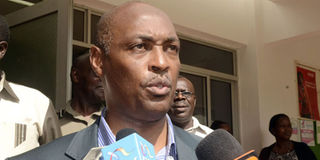
Former Director of Criminal Investigations boss Ndegwa Muhoro.
Ndegwa Muhoro
His replacement Francis Ndegwa Muhoro’s seven-year tenure at the DCI was wrought with controversy. He had been appointed just before the promulgation of the new Constitution in August 2010 — which came with sweeping changes in the security sector,with the force named the National Police Service.
Muhoro faced vetting by the National Police Service Commission, three years after he was appointed, following the constitutional requirement for all officers to be vetted afresh to check their suitability.
At one time, a detailed Independent Police Oversight Authority report cited his involvement in the unjustifiable transfer of three senior officers who were investigating a criminal matter on a friend of his.
Prominent lawyer Ahmednasir Abdullahi also linked Muhoro to the unending Tatu City land saga and an alleged assassination plan.
He was controversially ordered by the then Devolution Cabinet secretary Ann Waiguru, whose ministry was in the spotlight, to investigate the National Youth Service heist.
DCI would have ordinary be expected to only deal with the Directorate of Public Prosecution Keriako Tobiko on the matter.
It was also under his watch as the top detective that some high-profile audacious killings took place. They included Independent Electoral and Boundaries Commission ICT boss Chris Musando in 2017, businessman Jacob Juma in 2016 and Kabete legislator George Muchai in 2015.
To date, only in Muchai’s murder have suspects been charged in a protracted court case. It was during this time that DCI officers were accused of rampant corruption and unprofessionalism.
‘Wash Wash’and fake gold gangs also came into the limelight more prominently. Since then DCI has continuously lost its previous glory. Mr Muhoro was posted as ambassador to Malaysia in 2019 where he served away from public checks.
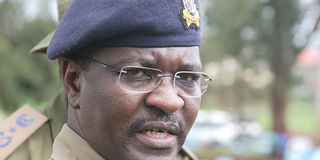
Former Police Commissioner Mathew Iteere.
Mathew Iteere
Mathew Iteere, a former General Service Unit commander, was the last Commissioner of Police before the introduction of the position of Inspector-General of Police in the 2010 Constitution.
He took over from Major Gen Ali in 2009 and it was during his term that the terror threat from Somalia-based al-Shabaab started becoming a reality — and heightened after the Kenya Defence Forces crossed into Somalia in October 2011. Gold scammers also continue to thrive.
Taking office just as the country was emerging and still healing from the 2007/2008 post-election violence, Iteere oversaw the investigations that were a precursor to the ICC indictments. The Israeli-trained commando served until 2012 when he was replaced by the first Inspector-General of Police David Kimaiyo.
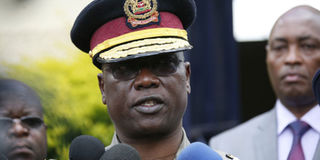
Then-Inspector General of Police David Kimaiyo at CID training institute in Nairobi on May 28, 2014.
David Kimaiyo
Like Iteere, Kimaiyo too had served as the commander, Presidential Escort Unit, before taking up the position of GSU Commandant.
He would oversee the 2013 elections. He is remembered by Kenyans for his ‘under sieke’ (under siege) pronouncement during the first high-profile al-Shabaab terrorist attack in Nairobi at the Westgate Mall in September 2013. The Mpeketoni deadly terror assault in June 2014 would follow soon after.
Earlier, he briefly worked as coordinator of the Kenya National Focal Point on Small Arms and Light Weapons after falling out with Maj Gen Ali before taking up the role of Director of Operations of the Kenya Police until 2008. The continuous killings by terrorists in Nairobi, and in areas bordering Somalia, is thought to have resulted in his removal from office.
He left a damaged police service that continued to lose public confidence.After his exit from police leadership,he vied for the Senate seat but was defeated during primaries by incumbent Kipchumba Murkomen (now Transport Cabinet Secretary).
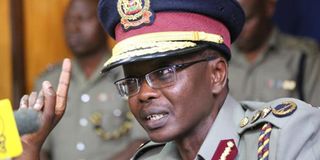
Then-Inspector General Joseph Boinett at a press conference shortly after taking office in Nairobi on March 12, 2015.
JosephBoinett
Joseph Boinett, a senior National Intelligence Service official, was appointed Inspector General of Police in 2015 after Kimaiyo’s exit in December 14, once again seen as a vote of no-confidence on senior career police officers.
He took over when al-Shabaab was terrorising the country with repeated improvised explosives and gun attacks. The April 2015 Garissa University attack was a vicious welcome to the new police boss. As a calculating police chief, Boinett relied on his intelligence colleagues to manage crime and even got some seconded to the service.
The August 2017 presidential election that became the first to be nullified, was followed by a repeat vote in October that triggered weeks of violence. Police were accused of high-handedness in dealing with protests.
It was also during his tenure that the first woman deputy Inspector-General of Police Grace Kaindi was dramatically hounded out of office. She was previously in charge of the Nyanza region, based in the hotspot of Kisumu,during the post-election violence. After his exit from office in March 2019, President Uhuru Kenyatta appointed Boinnet as Cabinet Administrative Secretary for Tourism.
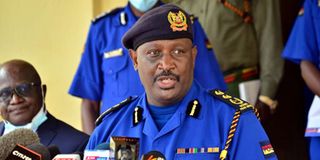
Then-Inspector-General of Police Hilary Mutyambai briefs the media outside Jogoo House in Nairobi on December 22, 2020.
Hilary Mutyambai
As the third Inspector-General, Hilary Mutyambai served four uneventful years from April 2019.
Although, like his predecessor, an intelligence officer, Mutyambai failed to leave a mark. A counter-terrorism specialist, he joined the Police in 1991 and rose through the ranks to become Superintendent of Police and later joined the Directorate of Security Intelligence in 1998.
Mutyambai proceeded on medical leave on August 26, 2022 — after the elections. He appointed his deputy Noor Gabow as the acting Inspector-General of Police.
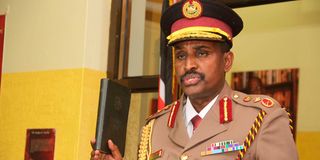
Then-Deputy Inspector-General of Police (Administration Police) Noor Gabow.
Noor Gabow
Gabows career is intriguing. Sometime in early 2000, the then-Officer Commanding Parklands Police Station, Noor Gabow, responded to a bank robbery at the Kenya Commercial Bank Sarit Centre on a Saturday. The events of that day would forever change his career’s trajectory, catapulting him into bigger responsibilities. When he arrived at the bank amidst the confusion, he received a tip-off contrary to what had been reported and embarked on an investigation that was to later establish that no such robbery had taken place.
A search conducted in the premises recovered millions of shillings from staff. As a reward for the revealing bank robbery, Gabow was redeployed as the deputy Officer Commanding Gigiri Police Division (OCPD) before he was picked up and seconded to the United Nations, where he served in several peacekeeping missions outside the country. On his return, Gabow was redeployed to Vigilance House, Police headquarters to be in charge of transport and later stores before he was appointed Deputy Inspector-General Administration Police Service to replace Samuel Arachi, who had retired.
One of his outstanding accomplishments is the meticulous picking of female officers for training and formation of the only women elite commando unit.
Against doubts,the unit has diligently served to protect Kenyans. Kenyans will remember Gabow as the officer who restored order that enabled the Independent Electoral and Boundaries Commission (IEBC) boss Wafula Chebukati announce the presidential election results in 2022. However, Mutyambai resigned from his position after he asked President William Ruto to proceed on terminal leave on health grounds.
His term was to end in March 2023. Japhet Koome, the current Inspector-General, was the surprise choice to succeed him.
Apart from Inspector Generals and commissioners, the last 20 years have also been shaped by some remarkable senior officers.
Julius Ndegwa, the retired former head of Police operations, is one such officer who now lives a quiet life. Ndegwa served as OCPD Central and Buru Buru before ascending to lead police operations. At the height of Mungiki matatu menace, he narrowly escaped death when an unknown gunman fired at him and the bullet swished past his anti-riot helmet during fracas at Nairobi’s Globe Cinema roundabout. What followed was a major crackdown on the proscribed gang with the formation of ‘Kwekwe’, ‘Spider’, ‘Rhino’ police squads which hunted down members of Mungiki gang.
Another retired senior officer and dreaded sharpshooter, Musa Yego, retired in 2021 and went into farming. Although he lives in Nairobi, Yego prefers the quiet farming life and reveals that he declined an opportunity to extend his service with the police on request. Yego, who joined the service in 1981, led the Flying Squad unit for years and was later redeployed as North Eastern Regional Criminal Investigation Officer.
He was at the helm of police leadership during the Garissa University attack in which suspected al-Shabaab terrorists killed 148 students.
He and eight other senior security and administrative officers in North Eastern were suspended following the attack. He sued NPSC for malice after staying out of service for two-and-a-half years. Because of his prowess, crime always dropped within his jurisdiction of operation and he was promoted to inspector.
He served in the African Union mission to Darfur,Sudan,as Chief of Mission and Contingent commander of the Kenyan Civilian Police.
Gideon Kibunja
Gideon Kibunja, who established the pioneer Criminal Investigation (CID) public relations office is yet another senior police officer who left a mark before his exit in December 2023.
Born and bred in Nairobi’s Eastlands, Kibunja served in various senior positions, including as the OCPD Vihiga, during his service before retiring last year.He once served as the Rift Valley Regional Criminal Investigations Officer (RCIO) based in Nakuru, Director, School of Leadership at the National Police College, Kiganjo.
The bespectacled Kibunja also recently served the Director Personnel at the Directorate of Criminal Investigations.Former head of Operations at DCI Francis Njiru is another senior police boss with an illustrious career that has since retired.
Njiru came to public limelight when he was appointed the head of Parklands police station based SPIV and then moved to dreaded Flying squad diligently served as a law enforcement officer. He was lauded for leading the crackdown on Mungiki at the time.Njiru served as Central CID Boss before being moved to Rift Valley in the same capacity.
After his retirement, Njiru has left public limelight preferring to live a quiet life.Gideon Kimilu, the immediate former head of Interpol, recently retired from the police force after years of service.
A relatively wealthy Kimilu will now concentrate on his businesses having lived most of his adult life as a senior police boss. Kimilu was involved in the Sh 6.4 billion drugs investigations in Malindi and Mombasa in 2004 in which several people were convicted in Kenya and Netherlands in 2004. Kimilu once served as a prosecutor and was involved in investigations relating to seizure of hashish in 2000.
Immediate former deputy Director of Criminal Investigations, Nicholas Ireri Kamwende, was also forced into retirement last month. Kamwende was the first Anti-Terrorism Police Unit boss that tackled the emerging terrorism threat in the country.Kamwende efficiently managed crime while the head of DCI in Nairobi Area.
Other senior police officers who played a significant role and have since retired include Peter Pamba (APS), Stephen Chelimo (GSU), Patrick Ombimo (DCI), Henry Barmao, Solomon Makau (ASTU), Samuel Nyabengi (DCI), Michael Barasa (DCI), Henry Ondiek (DCI), John Gachomo (DCI) among others.
